Reflective
VerifiedAdded on 2023/06/11
|6
|1552
|492
AI Summary
This reflective essay discusses the role of engineers, skills required for collaboration, becoming an expert, code of ethics, personal values, and job seeking. It also includes references.
Contribute Materials
Your contribution can guide someone’s learning journey. Share your
documents today.
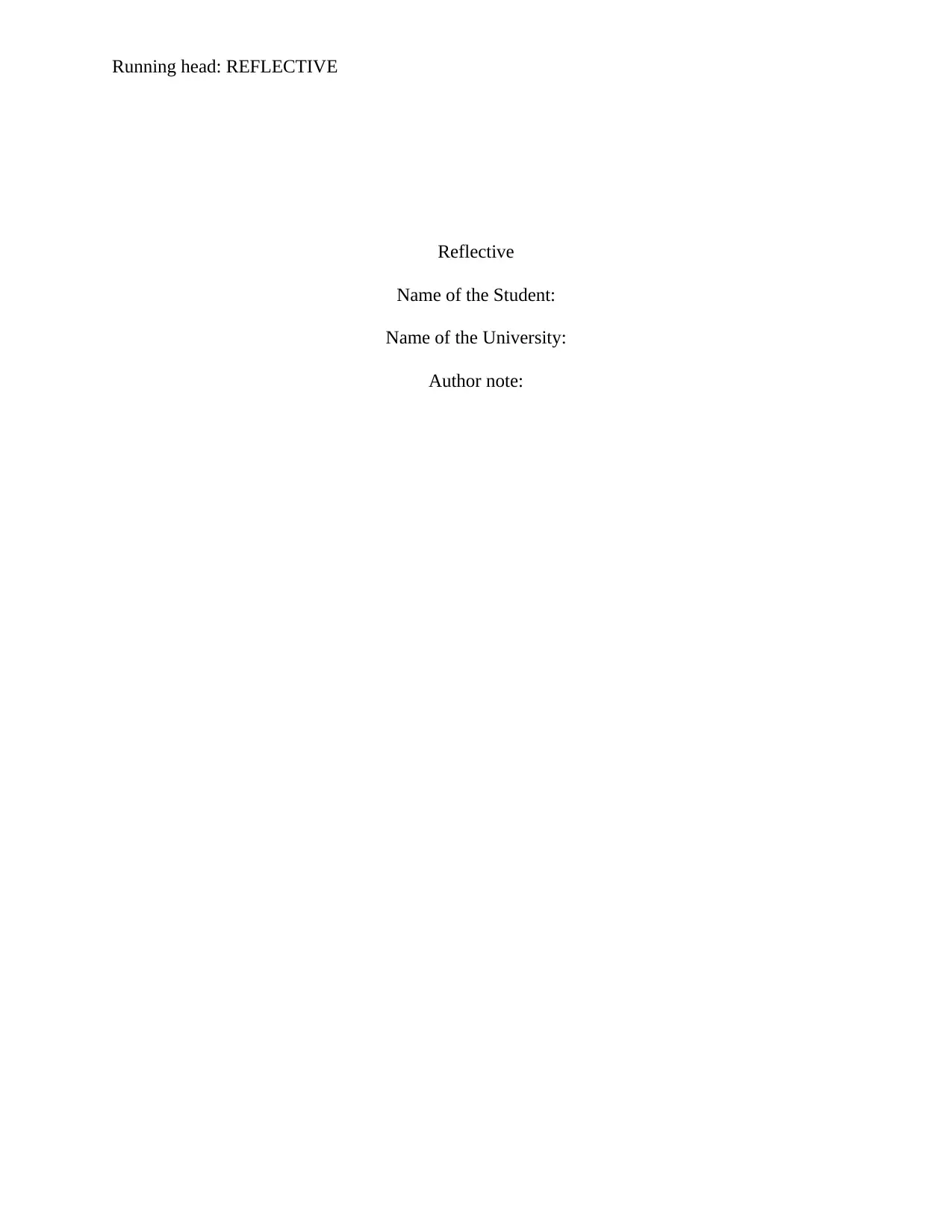
Running head: REFLECTIVE
Reflective
Name of the Student:
Name of the University:
Author note:
Reflective
Name of the Student:
Name of the University:
Author note:
Secure Best Marks with AI Grader
Need help grading? Try our AI Grader for instant feedback on your assignments.
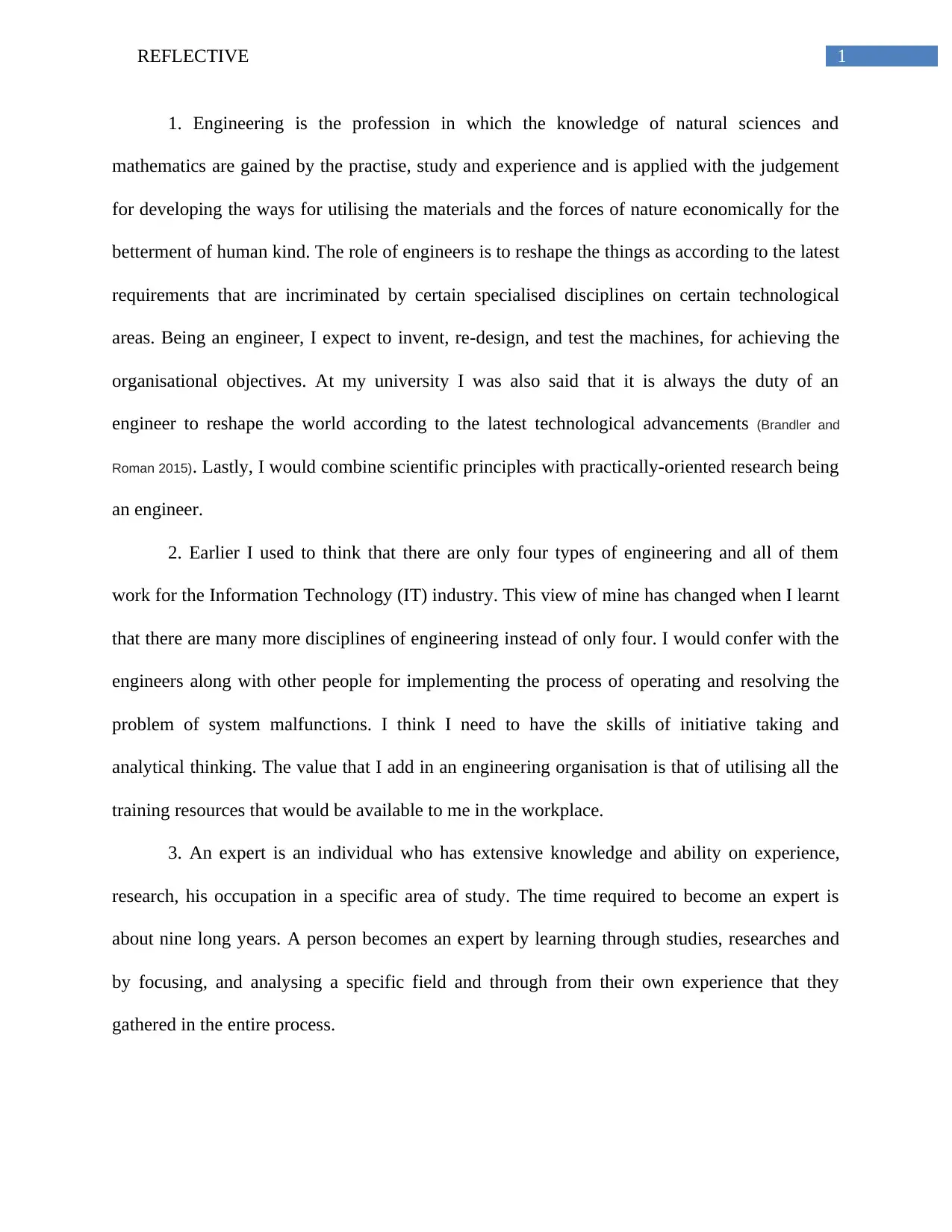
1REFLECTIVE
1. Engineering is the profession in which the knowledge of natural sciences and
mathematics are gained by the practise, study and experience and is applied with the judgement
for developing the ways for utilising the materials and the forces of nature economically for the
betterment of human kind. The role of engineers is to reshape the things as according to the latest
requirements that are incriminated by certain specialised disciplines on certain technological
areas. Being an engineer, I expect to invent, re-design, and test the machines, for achieving the
organisational objectives. At my university I was also said that it is always the duty of an
engineer to reshape the world according to the latest technological advancements (Brandler and
Roman 2015). Lastly, I would combine scientific principles with practically-oriented research being
an engineer.
2. Earlier I used to think that there are only four types of engineering and all of them
work for the Information Technology (IT) industry. This view of mine has changed when I learnt
that there are many more disciplines of engineering instead of only four. I would confer with the
engineers along with other people for implementing the process of operating and resolving the
problem of system malfunctions. I think I need to have the skills of initiative taking and
analytical thinking. The value that I add in an engineering organisation is that of utilising all the
training resources that would be available to me in the workplace.
3. An expert is an individual who has extensive knowledge and ability on experience,
research, his occupation in a specific area of study. The time required to become an expert is
about nine long years. A person becomes an expert by learning through studies, researches and
by focusing, and analysing a specific field and through from their own experience that they
gathered in the entire process.
1. Engineering is the profession in which the knowledge of natural sciences and
mathematics are gained by the practise, study and experience and is applied with the judgement
for developing the ways for utilising the materials and the forces of nature economically for the
betterment of human kind. The role of engineers is to reshape the things as according to the latest
requirements that are incriminated by certain specialised disciplines on certain technological
areas. Being an engineer, I expect to invent, re-design, and test the machines, for achieving the
organisational objectives. At my university I was also said that it is always the duty of an
engineer to reshape the world according to the latest technological advancements (Brandler and
Roman 2015). Lastly, I would combine scientific principles with practically-oriented research being
an engineer.
2. Earlier I used to think that there are only four types of engineering and all of them
work for the Information Technology (IT) industry. This view of mine has changed when I learnt
that there are many more disciplines of engineering instead of only four. I would confer with the
engineers along with other people for implementing the process of operating and resolving the
problem of system malfunctions. I think I need to have the skills of initiative taking and
analytical thinking. The value that I add in an engineering organisation is that of utilising all the
training resources that would be available to me in the workplace.
3. An expert is an individual who has extensive knowledge and ability on experience,
research, his occupation in a specific area of study. The time required to become an expert is
about nine long years. A person becomes an expert by learning through studies, researches and
by focusing, and analysing a specific field and through from their own experience that they
gathered in the entire process.
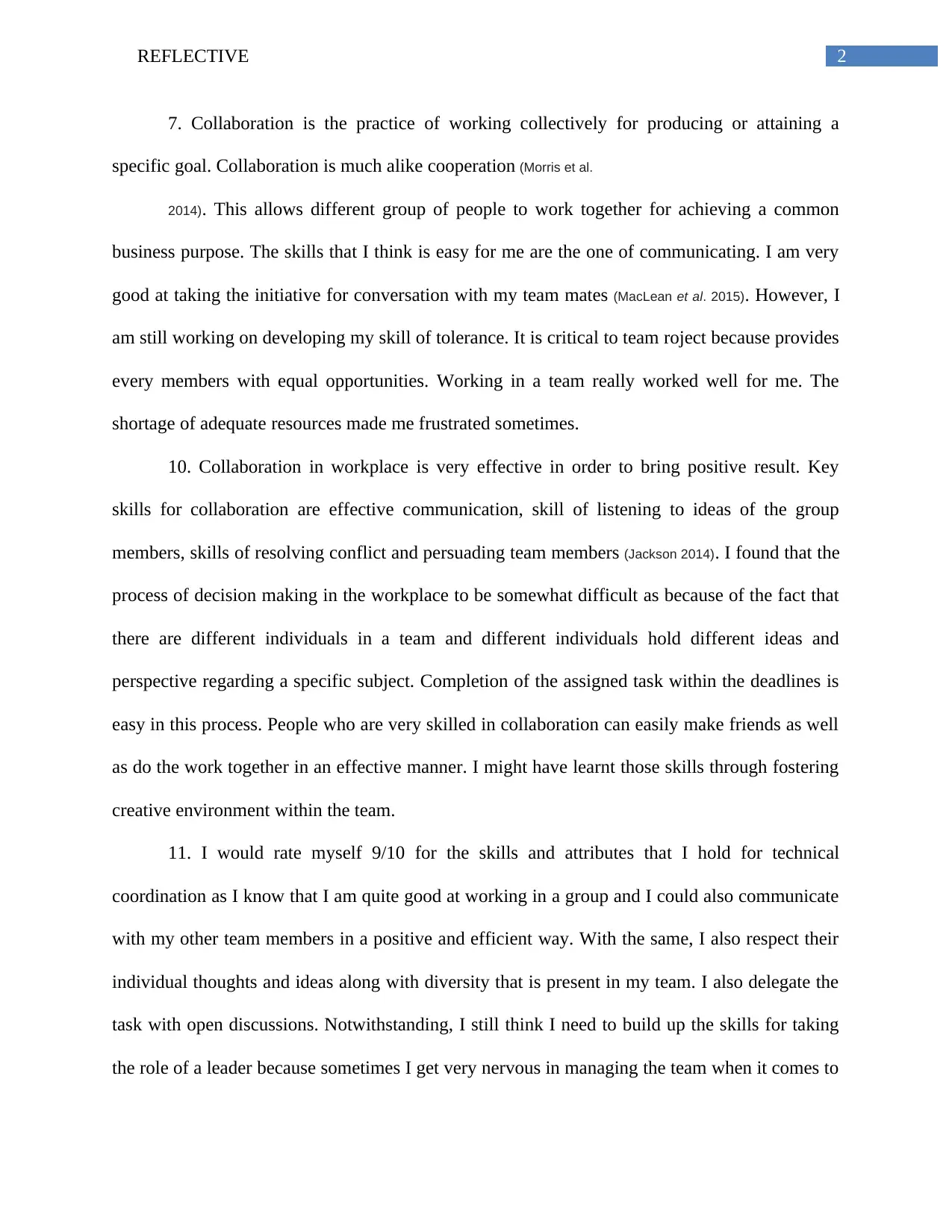
2REFLECTIVE
7. Collaboration is the practice of working collectively for producing or attaining a
specific goal. Collaboration is much alike cooperation (Morris et al.
2014). This allows different group of people to work together for achieving a common
business purpose. The skills that I think is easy for me are the one of communicating. I am very
good at taking the initiative for conversation with my team mates (MacLean et al. 2015). However, I
am still working on developing my skill of tolerance. It is critical to team roject because provides
every members with equal opportunities. Working in a team really worked well for me. The
shortage of adequate resources made me frustrated sometimes.
10. Collaboration in workplace is very effective in order to bring positive result. Key
skills for collaboration are effective communication, skill of listening to ideas of the group
members, skills of resolving conflict and persuading team members (Jackson 2014). I found that the
process of decision making in the workplace to be somewhat difficult as because of the fact that
there are different individuals in a team and different individuals hold different ideas and
perspective regarding a specific subject. Completion of the assigned task within the deadlines is
easy in this process. People who are very skilled in collaboration can easily make friends as well
as do the work together in an effective manner. I might have learnt those skills through fostering
creative environment within the team.
11. I would rate myself 9/10 for the skills and attributes that I hold for technical
coordination as I know that I am quite good at working in a group and I could also communicate
with my other team members in a positive and efficient way. With the same, I also respect their
individual thoughts and ideas along with diversity that is present in my team. I also delegate the
task with open discussions. Notwithstanding, I still think I need to build up the skills for taking
the role of a leader because sometimes I get very nervous in managing the team when it comes to
7. Collaboration is the practice of working collectively for producing or attaining a
specific goal. Collaboration is much alike cooperation (Morris et al.
2014). This allows different group of people to work together for achieving a common
business purpose. The skills that I think is easy for me are the one of communicating. I am very
good at taking the initiative for conversation with my team mates (MacLean et al. 2015). However, I
am still working on developing my skill of tolerance. It is critical to team roject because provides
every members with equal opportunities. Working in a team really worked well for me. The
shortage of adequate resources made me frustrated sometimes.
10. Collaboration in workplace is very effective in order to bring positive result. Key
skills for collaboration are effective communication, skill of listening to ideas of the group
members, skills of resolving conflict and persuading team members (Jackson 2014). I found that the
process of decision making in the workplace to be somewhat difficult as because of the fact that
there are different individuals in a team and different individuals hold different ideas and
perspective regarding a specific subject. Completion of the assigned task within the deadlines is
easy in this process. People who are very skilled in collaboration can easily make friends as well
as do the work together in an effective manner. I might have learnt those skills through fostering
creative environment within the team.
11. I would rate myself 9/10 for the skills and attributes that I hold for technical
coordination as I know that I am quite good at working in a group and I could also communicate
with my other team members in a positive and efficient way. With the same, I also respect their
individual thoughts and ideas along with diversity that is present in my team. I also delegate the
task with open discussions. Notwithstanding, I still think I need to build up the skills for taking
the role of a leader because sometimes I get very nervous in managing the team when it comes to
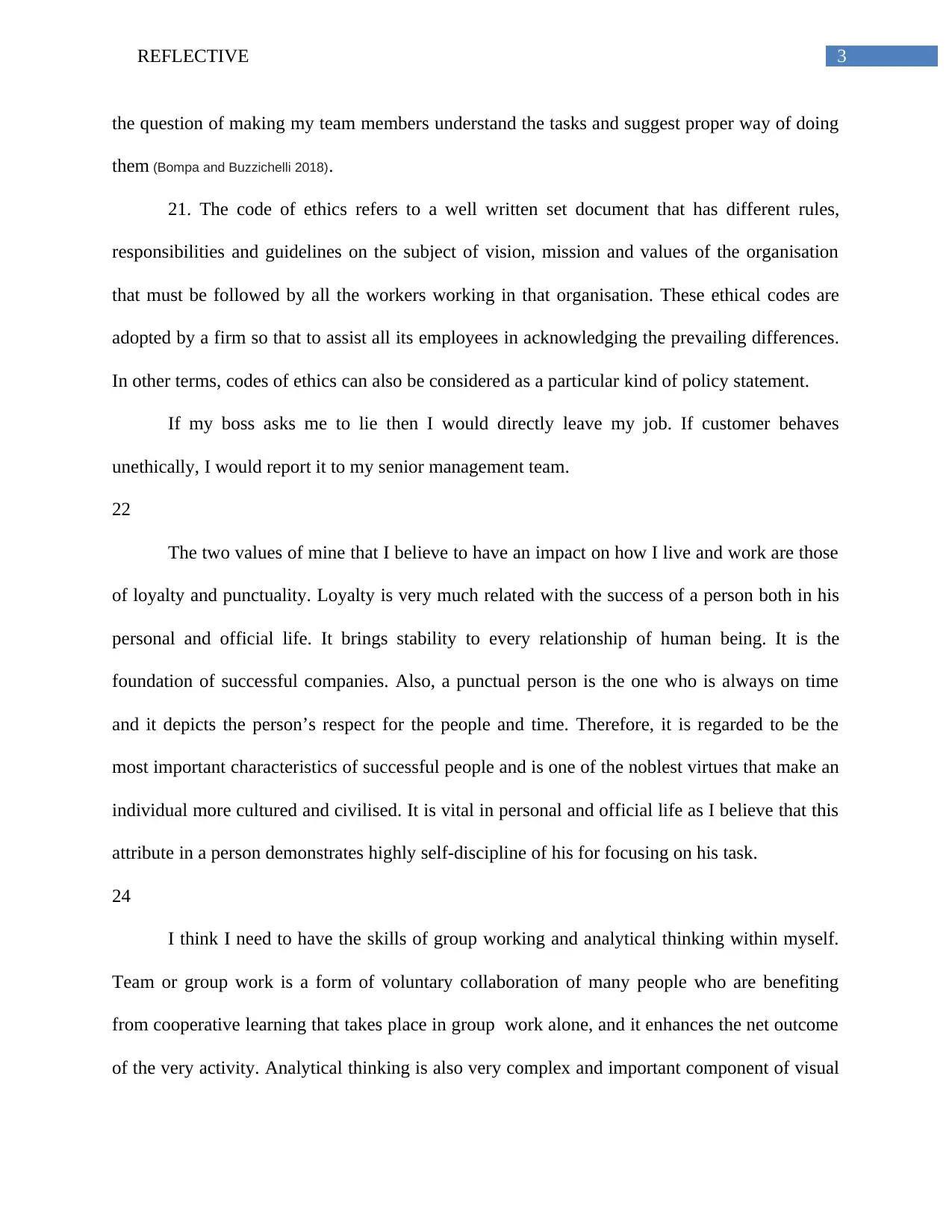
3REFLECTIVE
the question of making my team members understand the tasks and suggest proper way of doing
them (Bompa and Buzzichelli 2018).
21. The code of ethics refers to a well written set document that has different rules,
responsibilities and guidelines on the subject of vision, mission and values of the organisation
that must be followed by all the workers working in that organisation. These ethical codes are
adopted by a firm so that to assist all its employees in acknowledging the prevailing differences.
In other terms, codes of ethics can also be considered as a particular kind of policy statement.
If my boss asks me to lie then I would directly leave my job. If customer behaves
unethically, I would report it to my senior management team.
22
The two values of mine that I believe to have an impact on how I live and work are those
of loyalty and punctuality. Loyalty is very much related with the success of a person both in his
personal and official life. It brings stability to every relationship of human being. It is the
foundation of successful companies. Also, a punctual person is the one who is always on time
and it depicts the person’s respect for the people and time. Therefore, it is regarded to be the
most important characteristics of successful people and is one of the noblest virtues that make an
individual more cultured and civilised. It is vital in personal and official life as I believe that this
attribute in a person demonstrates highly self-discipline of his for focusing on his task.
24
I think I need to have the skills of group working and analytical thinking within myself.
Team or group work is a form of voluntary collaboration of many people who are benefiting
from cooperative learning that takes place in group work alone, and it enhances the net outcome
of the very activity. Analytical thinking is also very complex and important component of visual
the question of making my team members understand the tasks and suggest proper way of doing
them (Bompa and Buzzichelli 2018).
21. The code of ethics refers to a well written set document that has different rules,
responsibilities and guidelines on the subject of vision, mission and values of the organisation
that must be followed by all the workers working in that organisation. These ethical codes are
adopted by a firm so that to assist all its employees in acknowledging the prevailing differences.
In other terms, codes of ethics can also be considered as a particular kind of policy statement.
If my boss asks me to lie then I would directly leave my job. If customer behaves
unethically, I would report it to my senior management team.
22
The two values of mine that I believe to have an impact on how I live and work are those
of loyalty and punctuality. Loyalty is very much related with the success of a person both in his
personal and official life. It brings stability to every relationship of human being. It is the
foundation of successful companies. Also, a punctual person is the one who is always on time
and it depicts the person’s respect for the people and time. Therefore, it is regarded to be the
most important characteristics of successful people and is one of the noblest virtues that make an
individual more cultured and civilised. It is vital in personal and official life as I believe that this
attribute in a person demonstrates highly self-discipline of his for focusing on his task.
24
I think I need to have the skills of group working and analytical thinking within myself.
Team or group work is a form of voluntary collaboration of many people who are benefiting
from cooperative learning that takes place in group work alone, and it enhances the net outcome
of the very activity. Analytical thinking is also very complex and important component of visual
Secure Best Marks with AI Grader
Need help grading? Try our AI Grader for instant feedback on your assignments.
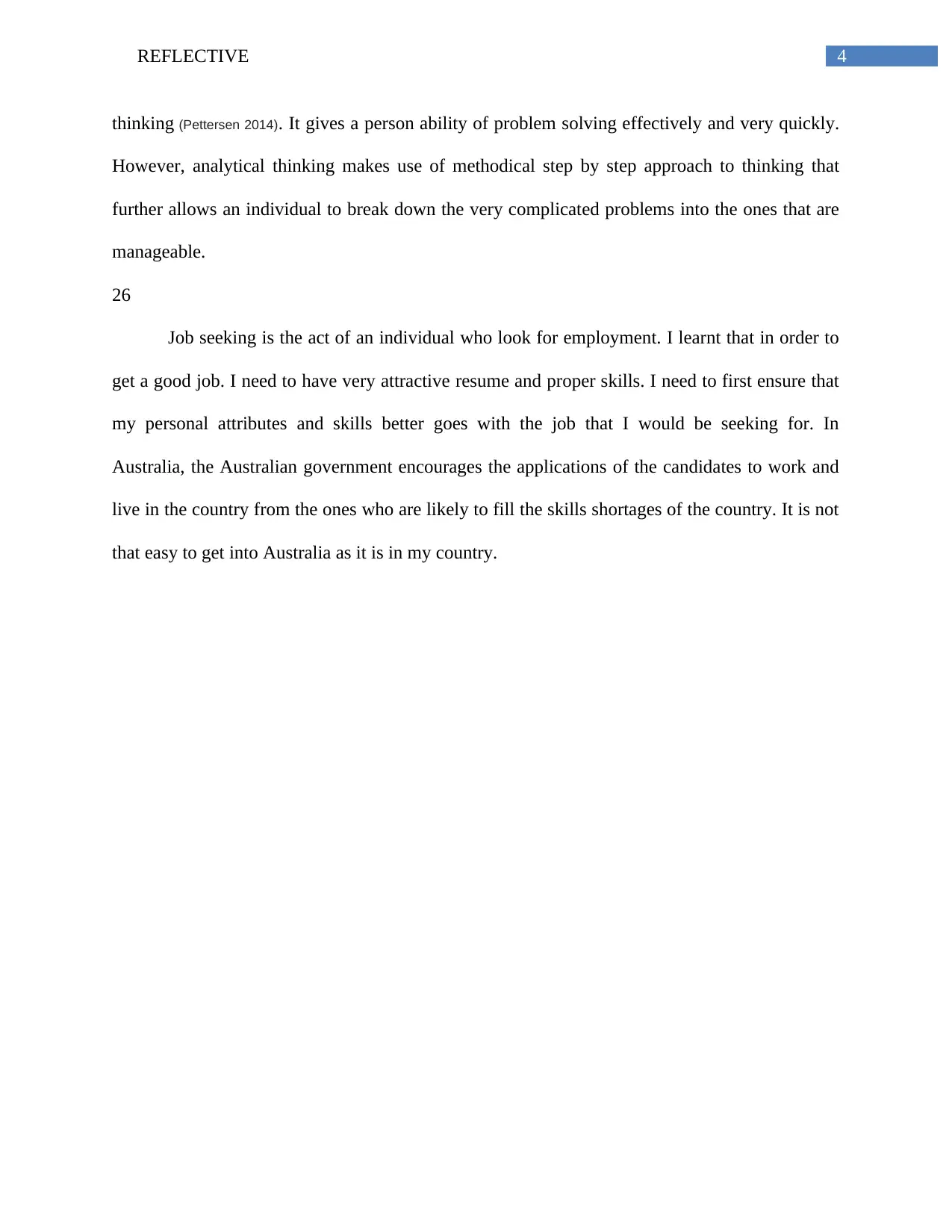
4REFLECTIVE
thinking (Pettersen 2014). It gives a person ability of problem solving effectively and very quickly.
However, analytical thinking makes use of methodical step by step approach to thinking that
further allows an individual to break down the very complicated problems into the ones that are
manageable.
26
Job seeking is the act of an individual who look for employment. I learnt that in order to
get a good job. I need to have very attractive resume and proper skills. I need to first ensure that
my personal attributes and skills better goes with the job that I would be seeking for. In
Australia, the Australian government encourages the applications of the candidates to work and
live in the country from the ones who are likely to fill the skills shortages of the country. It is not
that easy to get into Australia as it is in my country.
thinking (Pettersen 2014). It gives a person ability of problem solving effectively and very quickly.
However, analytical thinking makes use of methodical step by step approach to thinking that
further allows an individual to break down the very complicated problems into the ones that are
manageable.
26
Job seeking is the act of an individual who look for employment. I learnt that in order to
get a good job. I need to have very attractive resume and proper skills. I need to first ensure that
my personal attributes and skills better goes with the job that I would be seeking for. In
Australia, the Australian government encourages the applications of the candidates to work and
live in the country from the ones who are likely to fill the skills shortages of the country. It is not
that easy to get into Australia as it is in my country.
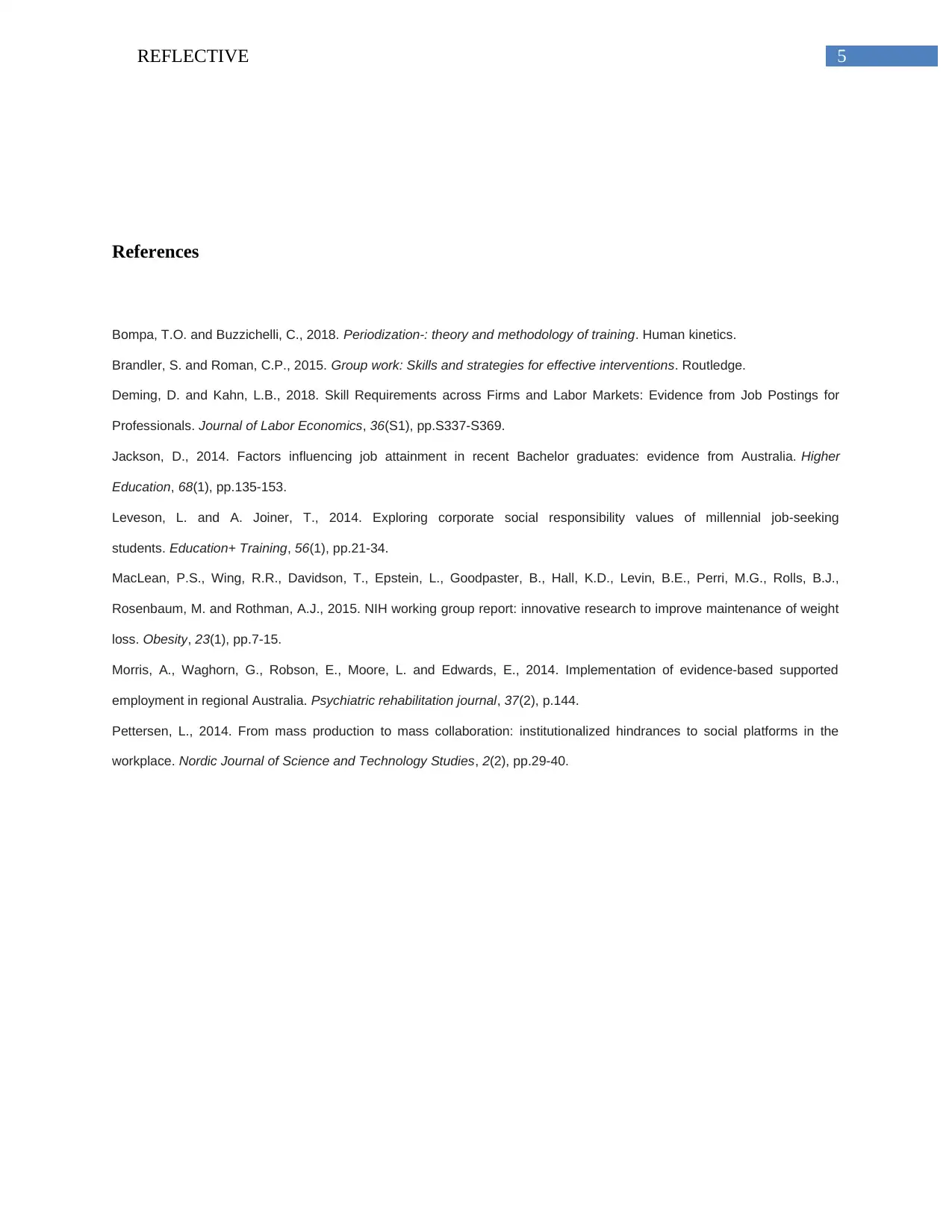
5REFLECTIVE
References
Bompa, T.O. and Buzzichelli, C., 2018. Periodization-: theory and methodology of training. Human kinetics.
Brandler, S. and Roman, C.P., 2015. Group work: Skills and strategies for effective interventions. Routledge.
Deming, D. and Kahn, L.B., 2018. Skill Requirements across Firms and Labor Markets: Evidence from Job Postings for
Professionals. Journal of Labor Economics, 36(S1), pp.S337-S369.
Jackson, D., 2014. Factors influencing job attainment in recent Bachelor graduates: evidence from Australia. Higher
Education, 68(1), pp.135-153.
Leveson, L. and A. Joiner, T., 2014. Exploring corporate social responsibility values of millennial job-seeking
students. Education+ Training, 56(1), pp.21-34.
MacLean, P.S., Wing, R.R., Davidson, T., Epstein, L., Goodpaster, B., Hall, K.D., Levin, B.E., Perri, M.G., Rolls, B.J.,
Rosenbaum, M. and Rothman, A.J., 2015. NIH working group report: innovative research to improve maintenance of weight
loss. Obesity, 23(1), pp.7-15.
Morris, A., Waghorn, G., Robson, E., Moore, L. and Edwards, E., 2014. Implementation of evidence-based supported
employment in regional Australia. Psychiatric rehabilitation journal, 37(2), p.144.
Pettersen, L., 2014. From mass production to mass collaboration: institutionalized hindrances to social platforms in the
workplace. Nordic Journal of Science and Technology Studies, 2(2), pp.29-40.
References
Bompa, T.O. and Buzzichelli, C., 2018. Periodization-: theory and methodology of training. Human kinetics.
Brandler, S. and Roman, C.P., 2015. Group work: Skills and strategies for effective interventions. Routledge.
Deming, D. and Kahn, L.B., 2018. Skill Requirements across Firms and Labor Markets: Evidence from Job Postings for
Professionals. Journal of Labor Economics, 36(S1), pp.S337-S369.
Jackson, D., 2014. Factors influencing job attainment in recent Bachelor graduates: evidence from Australia. Higher
Education, 68(1), pp.135-153.
Leveson, L. and A. Joiner, T., 2014. Exploring corporate social responsibility values of millennial job-seeking
students. Education+ Training, 56(1), pp.21-34.
MacLean, P.S., Wing, R.R., Davidson, T., Epstein, L., Goodpaster, B., Hall, K.D., Levin, B.E., Perri, M.G., Rolls, B.J.,
Rosenbaum, M. and Rothman, A.J., 2015. NIH working group report: innovative research to improve maintenance of weight
loss. Obesity, 23(1), pp.7-15.
Morris, A., Waghorn, G., Robson, E., Moore, L. and Edwards, E., 2014. Implementation of evidence-based supported
employment in regional Australia. Psychiatric rehabilitation journal, 37(2), p.144.
Pettersen, L., 2014. From mass production to mass collaboration: institutionalized hindrances to social platforms in the
workplace. Nordic Journal of Science and Technology Studies, 2(2), pp.29-40.
1 out of 6
Related Documents
Your All-in-One AI-Powered Toolkit for Academic Success.
+13062052269
info@desklib.com
Available 24*7 on WhatsApp / Email
![[object Object]](/_next/static/media/star-bottom.7253800d.svg)
Unlock your academic potential
© 2024 | Zucol Services PVT LTD | All rights reserved.




